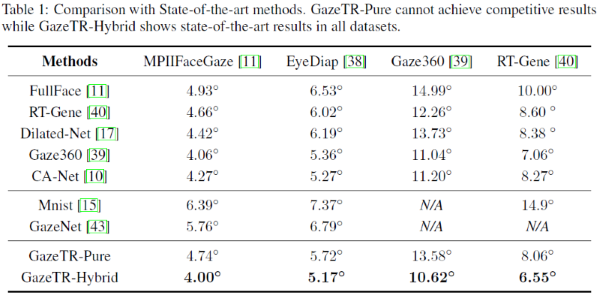We provide the code of GazeTR-Hybrid in "Gaze Estimation using Transformer". This work is accepted by ICPR2022.
We recommend you to use data processing codes provided in GazeHub. You can direct run the method' code using the processed dataset.
Note: Some people find that the code cannot be opened in their browser. Please directly download it and rename it as xx.py. In fact, the download step will be automatically processed, but the browser may cause this issue.
We build the project with pytorch1.7.0.
The warmup is used following here.
You should perform three steps to run our codes.
-
Prepare the data using our provided data processing codes.
-
Modify the
config/train/config_xx.yamlandconfig/test/config_xx.yaml. -
Run the commands.
To perform leave-one-person-out evaluation, you can run
python trainer/leave.py -s config/train/config_xx.yaml -p 0
Note that, this command only performs training in the 0th person. You should modify the parameter of -p and repeat it.
To perform training-test evaluation, you can run
python trainer/total.py -s config/train/config_xx.yaml
To test your model, you can run
python trainer/leave.py -s config/train/config_xx.yaml -t config/test/config_xx.yaml -p 0
or
python trainer/total.py -s config/train/config_xx.yaml -t config/test/config_xx.yaml
You can import the model in model.py for your own project.
We give an example. Note that, the line 114 in model.py uses .cuda(). You should remove it if you run the model in CPU.
from model import Model
GazeTR = Model()
img = torch.ones(10, 3, 224 ,224).cuda()
img = {'face': img}
label = torch.ones(10, 2).cuda()
# for training
loss = GazeTR(img, label)
# for test
gaze = GazeTR(img)
You can download from google drive or baidu cloud disk with code 1234.
This is the pre-trained model in ETH-XGaze dataset with 50 epochs and 512 batch sizes.
@InProceedings{cheng2022gazetr,
title={Gaze Estimation using Transformer},
author={Yihua Cheng and Feng Lu},
journal={International Conference on Pattern Recognition (ICPR)},
year={2022}
}
- A Coarse-to-fine Adaptive Network for Appearance-based Gaze Estimation, AAAI 2020 (Coming soon)
- Gaze360: Physically Unconstrained Gaze Estimation in the Wild, ICCV 2019
- Appearance-Based Gaze Estimation Using Dilated-Convolutions, ACCV 2019
- Appearance-Based Gaze Estimation via Evaluation-Guided Asymmetric Regression, ECCV 2018
- RT-GENE: Real-Time Eye Gaze Estimation in Natural Environments, ECCV 2018
- MPIIGaze: Real-World Dataset and Deep Appearance-Based Gaze Estimation, TPAMI 2017
- It’s written all over your face: Full-face appearance-based gaze estimation, CVPRW 2017
- Eye Tracking for Everyone, CVPR 2016
- Appearance-Based Gaze Estimation in the Wild, CVPR 2015
The code is under the license of CC BY-NC-SA 4.0 license.
Please email any questions or comments to yihua_c@buaa.edu.cn.


